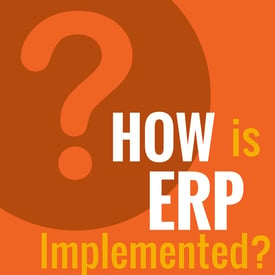Preparing for the implementation process and establishing a dedicated ERP team

Few projects have as much potential for improving operations as implementing a new ERP system. Implementation requires change and any change can be disruptive and overwhelming if not managed properly, so it’s important to make sure that you don’t overlook the topic of implementation during the research phase of your ERP initiative.
The implementation phase is the crucial transition period that takes you from the initial purchase of your ERP software to the point where you fully incorporate it throughout all departments and utilize it across your organization. To maximize benefits and minimize disruption, your ERP implementation needs to be thoroughly planned with a great deal of care, and commitment to the project needs to be consistent across the entire organization.
Dedicate the right resources by assembling a cross-functional ERP Implementation Team
It’s tempting to assume that members of your organization can add implementation tasks on top of their regular work, but that isn’t realistic in most cases. Select smart and experienced people from a variety of departments to manage the implementation, and allow them enough time to devote to the implementation project. It’s important not to delegate the implementation tasks solely to the IT function within your organization. Many companies make this mistake and forget that while ERP software is a new piece of technology, and new technology is usually managed by the IT department, this new ERP initiative will touch all aspects of your business and should be handled by members of management across all appropriate departments.
Who, specifically, should be a part of the team? Your team should be a group of leaders capable of setting the right goals and implementing a significant change across your organization. Your IT person will be heavily involved in the process, and will be responsible for any technical, connectivity, or hardware-related issues. The rest of the team should consist of members of management across departments representing accounting, scheduling, purchasing, operations, training, and any other essential business processes that will be impacted by ERP. In addition, it’s a good idea to identify one specific person to be accountable for overall project management.
The responsibilities of the ERP team are to:
- Research available ERP software options
- Agree on a list of features and functionality that whichever software you choose must have
- Set goals and objectives for the ERP initiative, including specific standards to which processes are expected to meet/improve, ROI expectations, etc.
- These goals should be very specific and measurable. Ex: instead of “improve audit score,” set a goal of “improve the score of audit on [specific audit date] by [X] points.”
- Develop a written implementation plan
- Hold other ERP team members accountable to make sure deadlines are met and the project moves forward at the expected pace
- Relay exciting news to the organization to keep everyone up to speed on the status of the ERP initiative and highlight important milestones and progress
- Gather feedback from employees across the organization to make sure everyone is receiving proper training and is comfortable using the new software
- Analyze metrics to assess the success of the implementation and report on ROI (this is why it’s important to set specific goals).
By creating this ERP team, you’ll be able to treat your company’s ERP implementation as you would any other major development or customer project and make sure everyone pulls their weight so that important deadlines and milestones are met. Nothing ruins the enthusiasm for a new system like continued delays in the go-live date. Managing the project in a way that prevents unpleasant surprises will pay off.
Develop (and stick to) a written ERP Implementation Plan
The ERP Team should develop a written implementation plan. This should define objectives, establish important milestones, set deadlines for each milestone and a firm date for going live with the software, include specific goals and metrics for measuring success, and serve as a guide to keep everyone on track. It should also include a list of all ERP team members and outline specific responsibilities of each person and the corresponding tasks.
The written implementation plan should also plan for audits at specific points throughout the process. This will serve as a way for the ERP team to assess the progress and readjust any aspects of the plan going forward to ensure success. Be prepared to adjust the timeline to accommodate circumstances that may arise during the process. Even if the project ends up getting a bit off track, if you stick to the components of the plan as much as possible, you’ll set your team up for success.
Don’t rush necessary training
If you’re going to spend the time and money to launch an ERP initiative, it’s important to make sure that your technology not only functions properly, but is well-understood by your employees so they can focus more on improving high-value business processes and procedures and less on executing daily tasks. Training all employees to prepare them for the implementation of the your organization’s new ERP software is an excellent way to make sure all departments are using the ERP system as intended. Doing this well in advance of the go-live date and then offering continued training will help prevent issues and delays due to a lack of understanding, and will ensure your company gets the best possible return on investment.
You’re certainly aware by now that ERP software is a big investment, and some of the biggest reasons ERP projects fail have to do with implementation, not technology. By dedicating the right resources, sticking to a written implementation plan, and making sure your entire organization is on board and receiving the proper training, your success will start long before your software is out of the box.






